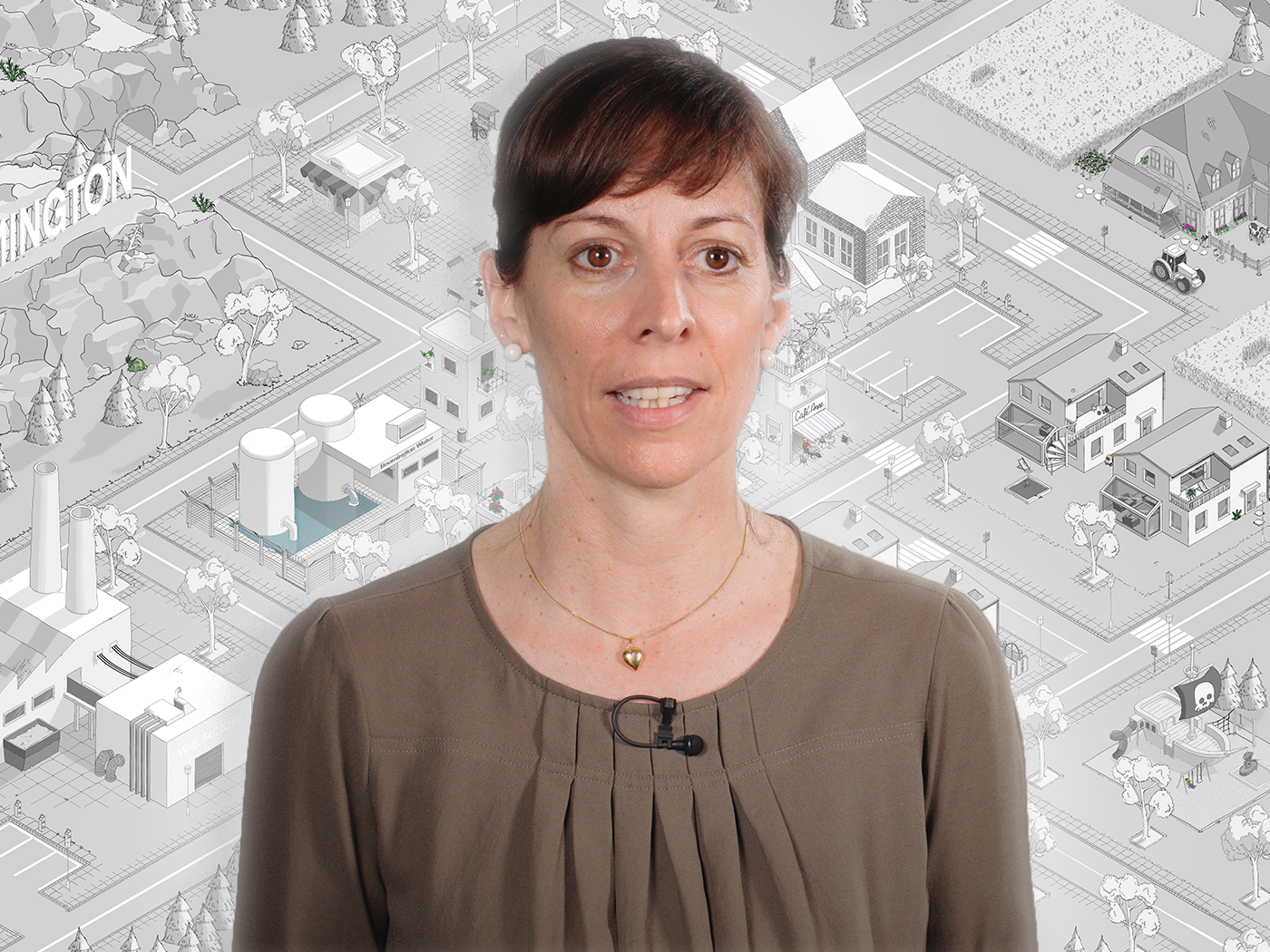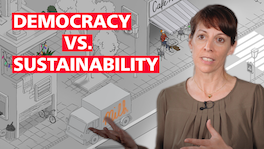Karin Ingold

Karin Ingold is professor at the Institute of Political Science and the Vice-President of the Oeschger Centre for Climate Change Research (OCCR). She leads the research group of Policy Analysis and Environmental Governance (PEGO) affiliated to the Institute of Political Science at the University of Bern and the Department of Environmental Social Sciences at EAWAG.
Karin Ingold is Associate Editor for Continental Europe for the Journal of Policy & Politics and in the editorial board of several scientific journals. In her research, she is interested in the analysis and design of policy processes and instruments and she became a scholar of the Advocacy Coalition Framework and other policy process theories
Her Video

Democracy vs. Sustainability
Step into the shoes of a small town’s Mayor and work your way up to the federal office. Make sustainable decisions for the benefit of the citizens. Should a food waste app be mandatory or voluntary? Should the majority of voters out rule the minorities? Are political processes even compatible with sustainability? This you will learn in this gamification video.
Institute
Selected publications
- Ingold, K.; Fischer, M.; Christopoulos, D. (2021). The roles actors play in policy networks: Central positions in strongly institutionalized fields. Network Science, online.
- Ingold, K.; Varone, F.; Kammerer, M.; Metz, F.; Kammermann, L.; Strotz, C. (2019). Are responses to official consultations and stakeholder surveys reliable guides to policy actors’ positions? Policy & Politics, online.
- Ingold, K.; Driessen, P.P.J.; Runhaar, H.A.C.; Widmer, A. (2018). On the necessity of connectivity: linking key characteristics of environmental problems with governance modes. Journal of Environmental Planning and Management, online.
- Ingold, K. (2017). How to create and preserve social capital in climate adaptation policies: a network approach. Ecological Economics, 131 (January 2017), 414-424.
- Ingold, K.; Fischer, M. (2016). “Belief Conflicts and Coalition Structures Driving Subnational Policy Responses: The Case of Swiss Regulation of Unconventional Gas Development”. In: Policy Debates on Hydraulic Fracturing, ed. C.M. Weible, T. Heikkila, K. Ingold and M. Fischer. Palgrave Macmillan, 201-237. DOI: 10.1057/978-1-137-59574-4_8.
- Ingold, K.; Pflieger, G. (2016). Two Levels, Two Strategies: Explaining the Gap Between Swiss National and International Responses Toward Climate Change. European Policy Analysis Journal, 2(1), 20-38.
- Ingold, K.; Leifeld, P. (2016). Structural and Institutional Determinants of Influence Reputation: A Comparison of Collaborative and Adversarial Policy Networks in Decision Making and Implementation. Journal of Public Administration Research and Theory, 26(1), 1-18.
- Ingold, K. (2015). Identifizierung von Koalitionen in Politikprozessen illustriert anhand der Schweizer Klimapolitik. Zwei strukturelle Ansätze. In: Gamper, M.; Reschke, L.; Düring, M.: Knoten und Kanten III – Soziale Netzwerkanalyse in Geschichts- und Politikforschung. Transkript Verlag, Bielefeld, 373-398.
- Ingold, K.; Gschwend. M. (2014). Science in policy-making: Neutral experts or strategic policy-makers? West European Politics, 37(5), 993-1018.
- Ingold, K., Fischer, M. (2014). Drivers of Collaboration to Mitigate Climate Change: An Illustration of Swiss Climate Policy over 15 Years. Global Environmental Change, 24(1), 88-98.
- Ingold, K. (2014). How involved are they really? A comparative network analysis of the institutional drivers of local actor inclusion. Land Use Policy, 39, 376-387.
- Ingold, K.; Balsiger, J. (2013). Sustainability Principles put into Practice: Case Studies of Network Analysis in Swiss Climate Change Adaptation. Regional Environmental Change, 529-598.
- Ingold, K.; Varone, F. (2012). Treating policy brokers seriously: Evidence from the climate policy. Journal of Public Administration Research and Theory, 22(2), 319-346.
Awards
- Theodore J. Lowi Policy Studies Journal, Best Article Award from the Public Policy Section of the American Political Science Association (2018)
- Swiss Academies Award for Transdisciplinary Research 2013, for Mountland CCES Project, Karin Ingold’s Post- Doc at ETHZ (2013)
- Grant by the Swiss National Foundation for the publication of her PhD thesis at Rüegger Editions (2008)
- Grant by the Swiss National Foundation for participation in Social Science Data Analysis & Collection, University of Essex Summer School (2005)
